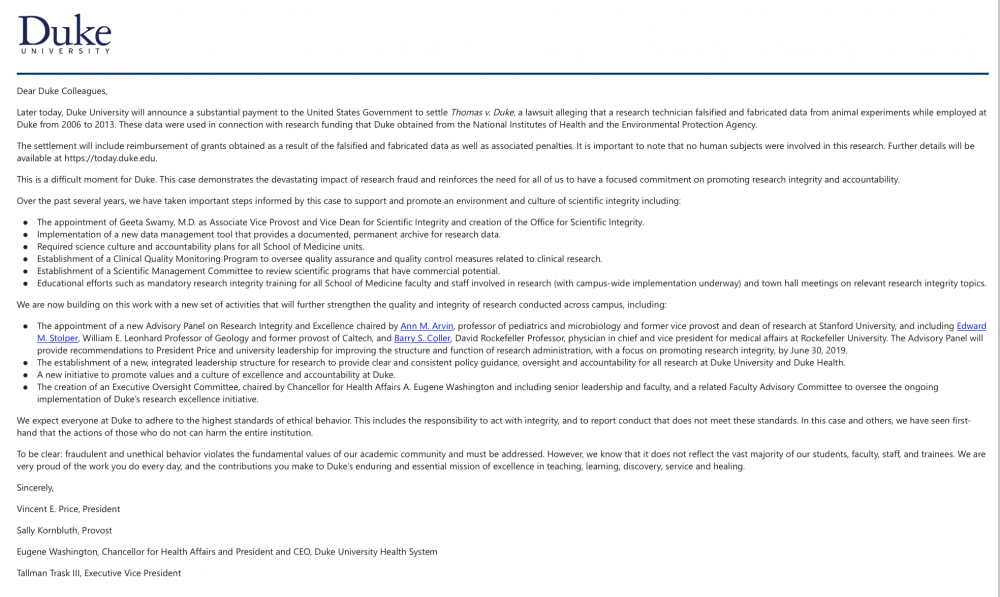Duke will pay $112.5 million to the federal government in a settlement for a lawsuit regarding its handling of falsified data that the suit alleged was linked to $200 million in federal research grants.
“This is a difficult moment for Duke,” President Vincent Price wrote in an email to the Duke community. “This case demonstrates the devastating impact of research fraud and reinforces the need for all of us to have a focused commitment on promoting research integrity and accountability.”
The lawsuit, filed by former lab analyst Joseph Thomas, alleged Duke used the data to obtain grants and covered up the fraud.
The lawsuit came from fraud allegedly committed by former Duke researcher Erin Potts-Kant. A researcher in the pulmonary, allergy and critical care department of Duke Health, Potts-Kant has had more than 12 scientific papers retracted since word broke of the allegedly falsified data.
Potts-Kant admitted to changing parts of the data but said that experiments actually were run. Thomas brought the case under the False Claims Act, which could have forced Duke to fork over as much as $600 million.
Thomas alleged Potts-Kant falsified data in research on mice’s lungs. From these data, labs at the University were able to secure additional federal funding, calling roughly $200 million in grants into question.
Others were also implicated in the lawsuit, including two of Potts-Kants’ supervisors: William Foster, ex-professor of medicine, and Monica Kraft, former division chief of the pulmonary division. The two supervisors were accused of negligence and ignoring warnings of misconduct.
The National Institutes of Health implemented additional regulations for Duke researchers in April 2018, requiring those applying for grants for less than $250,000 per year to provide a detailed budget of their proposed costs.
The email went on to outline steps Duke has taken to promote scientific integrity.
Price wrote that the University has taken many steps in recent years in order to “promote an environment and culture of scientific integrity,” such as creating the Office for Scientific Integrity and appointing Geeta Swamy as associate vice provost and vice dean for scientific integrity.
Duke brought a new data management tool, established required “science culture and accountability plans for all School of Medicine units” and created a program to monitor clinical quality, Price wrote. He added that the University established education efforts on integrity for all faculty and staff and made a committee to review “review scientific programs that have commercial potential.”
Price also announced new initiatives in the email.
Duke will appoint an Advisory Panel on Research Integrity and Excellence that will provide recommendations to the University on how to “promot[e] research integrity” by June 30. It will create a new research leadership structure and create an Executive Oversight Committee, which will be chaired by A. Eugene Washington, chancellor for health affairs, to oversee the changes.
“To be clear: fraudulent and unethical behavior violates the fundamental values of our academic community and must be addressed,” Price wrote. “However, we know that it does not reflect the vast majority of our students, faculty, staff, and trainees. We are very proud of the work you do every day, and the contributions you make to Duke’s enduring and essential mission of excellence in teaching, learning, discovery, service and healing.”
Check back for updates to this developing story.


